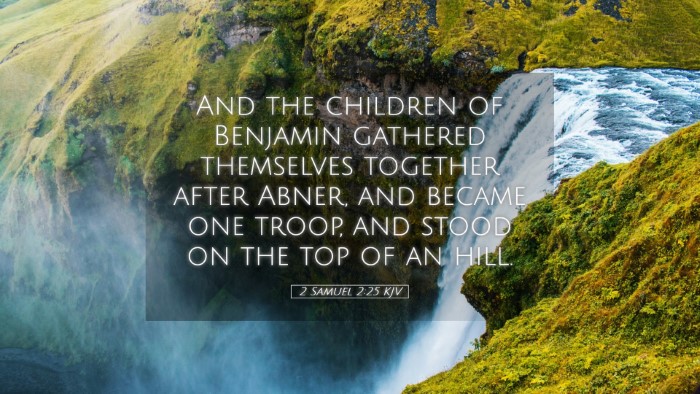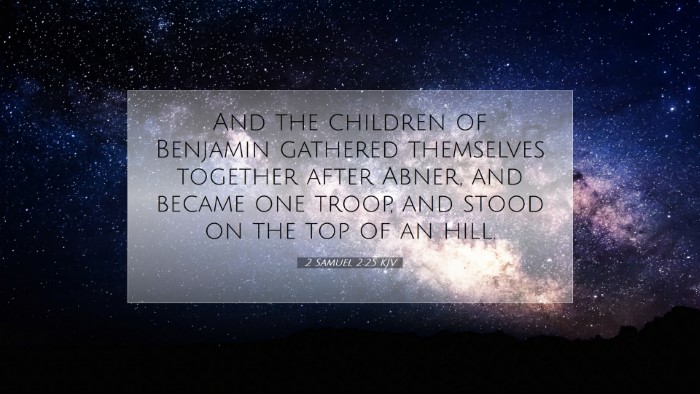Commentary on 2 Samuel 2:25
Verse Context: 2 Samuel 2:25 states: “And the children of Benjamin gathered themselves together after Abner, and became one troop, and stood on the top of a hill.” This verse occurs during a tumultuous time in Israel's history, following the death of Saul, when a power vacuum prompted conflicts among the tribes.
General Observations
This passage reflects a critical moment in the struggle for leadership between the supporters of Saul's house and David's rising influence. The actions of the Benjamites under Abner indicate loyalty to the former king and reveal the complexities of tribal allegiance.
The Gathering of the Tribe of Benjamin
Matthew Henry's Commentary: Henry notes that the children of Benjamin, being the smallest of the tribes, displayed remarkable unity and resolve in rallying behind Abner. This support derived not only from familial ties but also from a desire to maintain the influence they had under Saul.
Albert Barnes' Insights: Barnes indicates that Abner's call to arms showcases his efforts to consolidate remaining loyalists of Saul's lineage. The choice of a hill as their position suggests a strategic advantage, reflecting military wisdom in a time of conflict.
The Role of Abner
Adam Clarke's Analysis: Clarke emphasizes Abner’s pivotal role as a military leader and political player during this transition period. He points out Abner's leadership qualities and his ability to command respect and loyalty despite the overarching chaos. Clarke asserts that Abner acts as a bridge between the past (Saul's reign) and the potential future (David's kingship).
The Symbolism of the Hill
The hill represents a place of strength and visibility. It allows for a strategic overview of the battlefield, symbolizing the Benjamites’ desire to rise even after the fall of their king.
- Spiritual Reflection: The hill can be seen as a metaphor for spiritual elevation. The struggle to seek God's favor from a place of strength is a recurring theme throughout the scripture.
- Leadership Dynamics: The choices made by Abner and the Benjamites reflect the complex nature of leadership, where loyalty, strategy, and moral decision-making intertwine.
Application for Today's Readers
This passage prompts contemporary readers to consider the nature of loyalty and the conflicts arising from allegiance. Many lessons can be drawn from this moment in Israel’s history:
- Understanding of Allegiance: The Benjamites’ gathering highlights the importance of understanding one's loyalties—whether to ethnic, historical, or spiritual leaders.
- Strategic Thinking: The emphasis on military strategy exemplifies the necessity for careful planning in one's endeavors, be they spiritual, personal, or communal.
- Resolution in Leadership: Abner’s moment of consolidation urges modern leaders to take a stand during divisive times, encouraging unity among those they lead.
Theological Implications
Throughout this passage, there is a profound exploration of divine providence at work amidst human schemes. The actions of Abner and the Benjamites propel the narrative towards the eventual unification of Israel under David’s kingship, a significant theological theme of God’s sovereignty over nations and leaders.
Conclusion
Final Thoughts: The events chronicled in 2 Samuel 2:25 not only serve as a historical account but are rich with theological significance and practical lessons. The unity of the Benjamites under Abner represents the tension between past allegiances and future possibilities. As we reflect on this passage, it encourages believers to evaluate their own loyalties, the significance of strategic leadership in the face of challenges, and ultimately, to recognize the overarching hand of God at work through all events in history.


